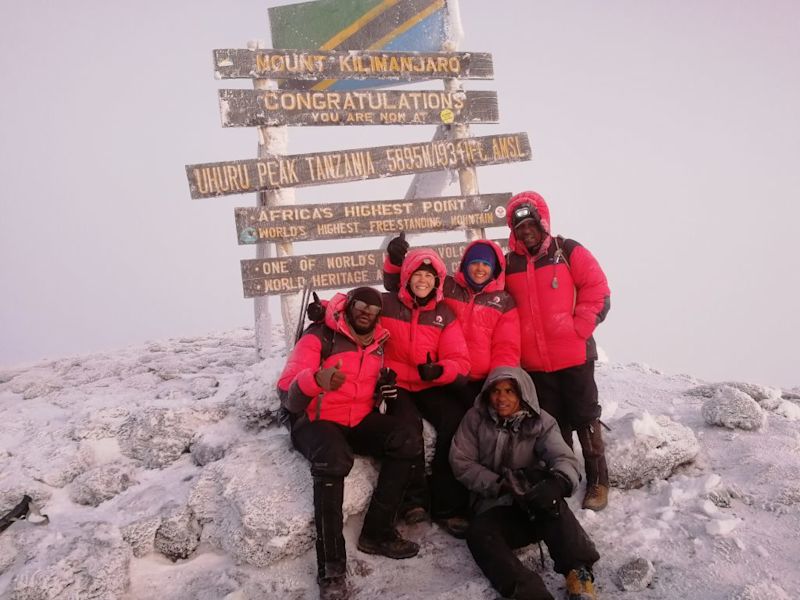What is summit night?
Summit night is the part of a Kilimanjaro climb where you set out from base camp for the highest point of Kilimanjaro, Uhuru Peak. That base camp is either Horombo Hut ( or, more likely, Barafu Camp (. So with Uhuru Peak rising to 5,895 m (19,340 ft) above sea level, that's one big push!
Specifically, the climb you tackle on summit night starts at midnight. The aim is to reach Uhuru Peak within an hour of sunrise. But after spending some time at the summit, you must still then trek all the way down to Mweka Camp or Marangu Camp in the mountain's rainforest band. And so summit 'night' only ends late in the afternoon!
You start hiking at midnight. Then, after reaching the summit around sunrise, you must still trek about half way back down the mountain. It’s one mammoth day that truly tests your mettle!
How hard is summit night?
Summit night on Kilimanjaro is really tough, both mentally and physically. It's actually the main reason for why we think climbing Kilimanjaro is harder than trekking to Everest Base Camp!
Here are the reasons why summit night on Kilimanjaro is such a toughie:
- It’s so gosh-darn bleeping cold!
- The wind can be fierce, especially at the summit where there’s no buffer against it.
- Starting the trek in the dead of night can be mentally daunting.
- You’re trekking on top of little (and probably poor-quality) sleep.
- It’s the steepest part of the entire trek.
- The scree can be hard to navigate.
- You hike for around 13 to 16 hours (depending on your route and fitness).
- The air is really thin, so breathing is difficult.
- The extreme altitude can make you feel sick (for instance, dizzy or nauseous).
It’s because the climb is very hard that you feel so glorious when you reach the summit!
Trekkers on summit night form a line up the slope, their headlamps illuminating the way
Joel had this to say about summit night:
Summit night is by far the hardest part of the hike for various reasons: it’s freezing, it’s dark, due to the altitude you only walk very slowly, and you know this is the part where the people who did not make it to the top had to give up. You will certainly ask yourself why exactly you are doing this and why watching a movie on the couch at home wasn’t good enough for you? But in the end for us, the group spirit, the motivation of the guides and the adrenalin of completing this adventure carried us all the way up! The feeling on top has no words to describe.
How can I prepare for summit night?
So with summit night being really hard, it's a good idea to prepare for it ...
Prepare yourself mentally
To summit Mt Kilimanjaro you need determination. Build up your resolve and self-belief long before you even step onto a plane bound for Tanzania. Learn about the potential unpleasant side effects of extreme altitude so that you can mentally determine to push through the pain and discomfort.
Also, be sure to do whatever works for you – journal your goal, make a vision board, speak to those who have made the climb for insights and inspiration, whatever. This is your dream, so work on it mentally. For more insight in this vein, you might like to read 5 bits of advice from past Kilimanjaro climbers.
Sometimes you have to summit the mountain in mist
Prepare yourself physically
As we discuss in How should I train for Kilimanjaro?, your physical preparation is of the utmost importance. And at no point does that preparation show up more than on summit night.
Summit day is by far the longest day's hike on all of the different Kilimanjaro routes. On the southern-face ascent routes like the Lemosho and Machame, for instance, your summit hike requires you to climb over one vertical kilometre from Barafu Camp to Uhuru Peak. This takes about six to eight hours.
Also remember that high altitude makes all exercise harder than usual. This is because the oxygen level of the air is reduced. If you're able to train at altitude in the lead up to Kilimanjaro, that's a great plus.
The beauty awaiting you at the summit is a big motivation to push through when it's hard
You might like to read our Trekking tips for beginners if Kilimanjaro is one of your first major (high-altitude) treks. And you might also like to read 10 tips for climbing and summiting Kilimanjaro.
Finally, Chris Sichalwe, director of Follow Alice Tanzania, who has been to the summit of Kilimanjaro over a hundred times, offers some good advice about summit night in the video below.
Finally, please lean on your team
Believe us when we say that summit night is made imminently more doable when you lean on the team around you for support. At the heart of that team is your mountain crew, especially your guides, who cheer you on and keep you going even when you're ready to give up.
Tash had this to say about the value of the Kilimanjaro team to her on summit night:
Summit night was definitely the hardest part of the entire climb for me. There were a couple of points, when the wind was so strong and it was so bitterly cold, that I wanted to stop and turn around. However the guys and my team really motivated me and kept me going. I appreciated them before, but it wasn’t until this particular moment that I knew they were the main reason I was making it up this mountain.
She adds:
I appreciated the mountain crew before, but it wasn’t until [summit night] that I knew they were the main reason I was making it up this mountain.
You can see more of Tash's Kilimanjaro summit in her video journal below.
So please remember to lean on your team, and particularly your guides, if you're having a tough time on summit night. It's a big challenge to climb up Kilimanjaro in the dark and cold, but you're never alone!
In summary, prepare, believe, and lean on your team, and then you'll make it to the top!








